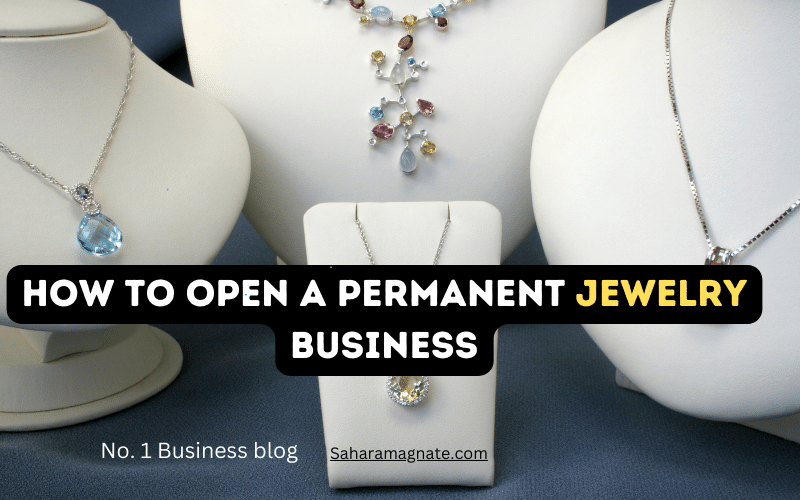Jewelry can bring sparkle to any outfit, and it only makes sense that you’d want to start your own business selling permanent jewelry.
But starting a jewelry business isn’t as easy as just buying and putting some jewelry in store. There are a lot of things that need to be considered before starting this type of business.
That’s why we’ve created this guide to starting a permanent jewelry business – it will help you understand the legal, financial, and logistical aspects of running such a business.
We’ll also cover marketing and pricing strategies and offer tips on how to make sure your jewelry sells itself.
By the end of this guide, you’ll be able to create an effective plan that you can use to get your permanent jewelry business off the ground.
How To Open A Permanent Jewelry Business
Starting a permanent jewelry business requires a lot of planning and preparation. There are so many things to consider. Here is an overview of what you must do.
You must determine your business concept, including the type of jewelry and accessories you want to offer, the target market, location, and pricing strategy.
Also, research your research competitors in the market, pricing models, and trends in the industry.
Additionally, look into any legal or financial requirements for starting a business in your area.
After that, it’s time to get the ball rolling on creating your brand identity. That includes designing a logo, creating a website and social media accounts, and developing marketing materials such as brochures or flyers.
You also need to consider how you will display and store your products; this will set the tone for your shop’s atmosphere when customers come in.
Now, let’s get into starting a jewelry business in more detail;
Researching the Market
When starting a permanent jewelry business, research is your best friend. Research what types of products are most in-demand, what the competition is like, and what potential customers are looking for.
You should also consider researching the market to determine what pricing structure you should offer—is it better to focus on affordable pieces or high-end items?
It’s also essential to understand current trends in the jewelry industry and how they apply to the products and services you want to offer.
This includes keeping up with social media trends and being aware of new styles or niche items that could benefit your business.
Additionally, you’ll want to research local services and structures that will help you run and manage your business effectively.
That includes looking into taxes, labor laws, building codes, licensing requirements, etc.
Where to Find Your Supplies
One of the most essential parts of starting a permanent jewelry business is knowing where to find your supplies.
You’ll need to be able to source beads, findings, and other materials for your pieces reliably and consistently.
This is a great place to start when starting a permanent jewelry business—check out supplier catalogs or websites and compare prices, shipping costs, and payment options before making any decisions.
When looking for suppliers, it’s essential to consider the following:
- Quality:
Make sure you’re getting the highest quality materials. This means researching your suppliers and ensuring they have good customer reviews and can provide samples of their products if needed.
- Cost:
Ensure you’re getting the best possible deal on all your supplies. Some suppliers offer discounts if you buy in bulk, so keep that in mind when ordering your materials.
- Availability:
It’s essential that you can get your supplies when you need them; otherwise, it will strain your production schedule. Most suppliers have an online store where you can view product availability in real-time and order what you need quickly and easily.
- Delivery time:
If your supplies take too long to arrive, working with that particular supplier might not be worth it. Look for suppliers who offer fast delivery times so you don’t have any delays in your production schedule.
Creating a Business Plan and Budget
When starting any business, a business plan is essential. A business plan lets you map out your vision, set goals, and track your progress.
It also provides a baseline for you to measure your success. To start a jewelry business, you’ll need to understand the market and create a plan that reflects that knowledge.
When creating your business plan:
- Establish clear objectives that you want to achieve with your jewelry business.
- Identify potential customers and determine how you can reach them.
- Create awareness of the products and services offered by your company.
- Analyze how the competition differs from yourself.
- Develop an effective marketing strategy for selling jewelry.
- Determine pricing for pieces of jewelry and accessories.
- Create a budget for startup costs and operating expenses.
- Research potential sources of financing like loans or grants.
- Prepare projections for revenue and profit margins.
- Create a timeline for when certain milestones should be achieved.
- Establish an exit strategy in case the business isn’t succeeding as expected.
A strong, well-thought-out business plan can help guide you in the right direction while starting this venture, so spend enough time planning before diving head-first into this new endeavor!
Obtaining the Necessary Licenses and Permits
You must obtain specific licenses and permits before you can open your jewelry business. The exact requirements depend on the state in which you plan to operate.
The process for obtaining licenses and permits typically includes submitting an application, passing a background check, and paying applicable fees.
Additionally, you may be required to obtain a business tax identification number from the IRS. This will allow you to report your business income and expenses on your tax return.
It’s also important to understand what zoning laws apply to your business. Typically, businesses must comply with local zoning laws regarding noise levels, parking requirements, signage placement, and other factors affecting the surrounding neighborhood.
Lastly, some states require a special license or permit for selling jewelry online or at trade shows or conventions.
Make sure you research the specific regulations in your state and obtain the necessary licenses before you open your permanent jewelry business.
Setting Up a Business Space and Finding Customers
Opening your own jewelry business is an exciting and rewarding process. As you start to move forward with your jewelry business, you need to ensure you have the suitable space to work in.
You also need to ensure you have customers ready and willing to buy products from your shop.
Setting Up a Business Space
You need to find a suitable space for your permanent jewelry business to get started. You’ll likely want two locations—one for the actual store and one for back-end operations like designing pieces and packaging orders.
You should also consider factors like foot traffic and parking, affecting how many customers can access your store.
Finding Customers
Of course, having the space isn’t enough—you also need customers! To ensure that your business has plenty of customers, it’s a good idea to create an online presence and connect with people online and offline.
Try setting up social media accounts such as Instagram or Facebook so people can learn more about you and what you offer.
You could also consider hosting events in local stores or galleries to introduce potential customers to your designs in person.
These strategies can give you visibility and raise awareness about your brand, which can attract more customers.
Tax Regulations for Permanent Jewelry Businesses
If you are planning to open a permanent jewelry business, it’s essential to understand the tax regulations involved.
Just like opening any other business, there are certain taxes that you need to be aware of before you start.
Federal taxes
There are three basic types of federal taxes: income tax, self-employment tax, and employment taxes.
Income tax is usually the biggest expense for any business owner and applies to all income earned.
Self-employment tax covers Social Security and Medicare contributions due from self-employed taxpayers and must be paid in addition to your regular income tax payments.
Lastly, employment taxes include Social Security, Medicare, and federal unemployment (FUTA) taxes that must be paid if you hire employees for your jewelry store.
State taxes
Depending on where you start your business, there may also be state or local taxes that need to be paid in addition to federal taxes.
Your state or city may require you to pay a sales tax on items purchased from your store and collect a use tax on items purchased outside your state or country and resold within the State.
Additionally, some states require businesses that sell alcohol or tobacco products to pay an additional sales/tobacco/alcohol excise every month or quarter.
It’s important that when starting a jewelry store, you familiarize yourself with these different requirements and ensure that they are taken into account when pricing your products.
Conclusion
Starting a permanent jewelry business can be a great way to make a living doing something you are passionate about.
It takes a lot of hard work and dedication, but anyone can succeed in this industry with the right resources and a sound business plan.
The key to success is to plan and do your research. Consider how much you are willing to spend, the location of your business, the type of jewelry you will specialize in, and your shop’s overall look and feel.
Additionally, deciding whether you will be selling online, in a physical shop, or both is essential.
Once your business opens, you can start marketing your product and developing customer relationships. With the right strategy, you can build a successful jewelry business quickly.






